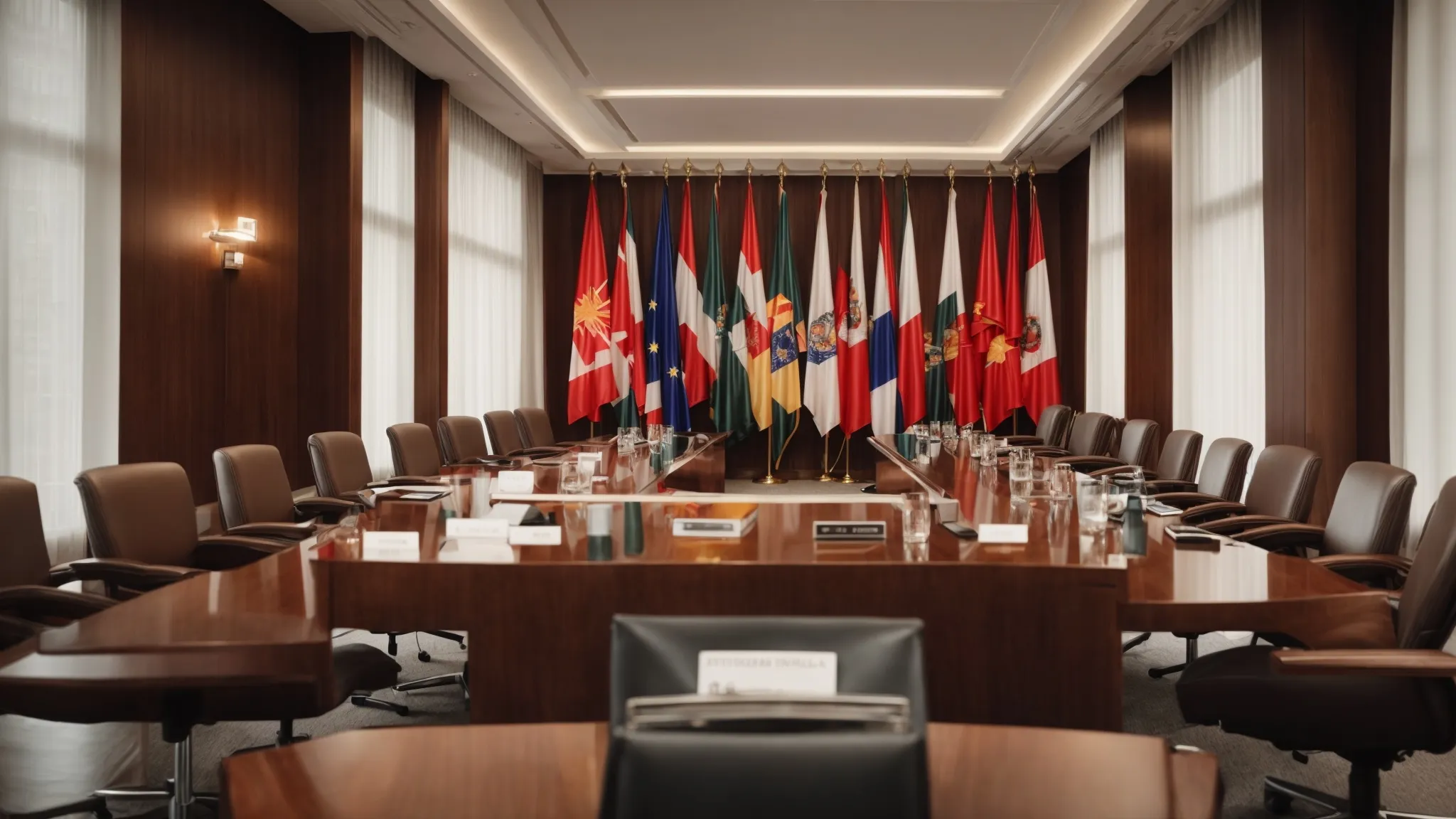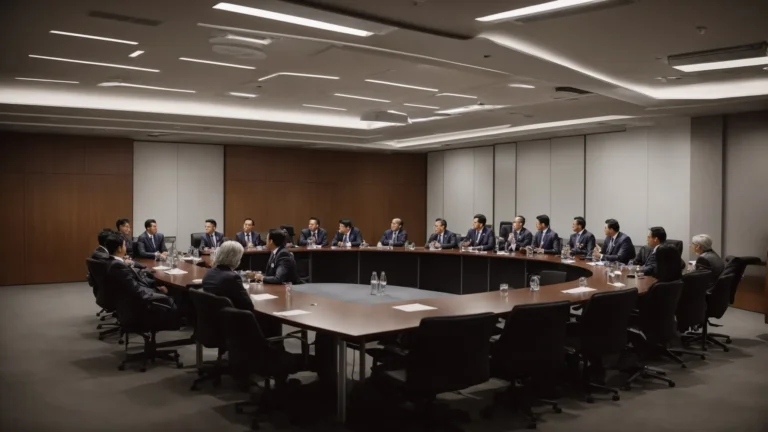Understanding the Impact of ISDS Reform on Global Investment Strategies
The construct of investor-state dispute settlement (ISDS), a primary mechanism within international investment law for resolving conflicts between foreign investors and host states, is critical with sweeping ISDS reforms underway. As governments and international organizations like the United Nations Commission on International Trade Law and the World Trade Organization rally for changes, the very ethos of ISDS remains under intense scrutiny.
Anchored by the evolving contours of investment treaties and the persistent demands for fairer investment protection, firms must navigate a labyrinth of new risks and opportunities that surface with these reforms.
The intricate dance of negotiation between multinational companies and host countries extends beyond mere economics, touching the delicate fabric of investment governance and human rights law.
Keep reading to unravel how these ISDS reforms are reshaping the global investment landscape.
Key Takeaways
- ISDS Reform Is Aimed at Addressing Asymmetries and Increasing Transparency in International Investment Disputes
- A Recalibrated Framework May Lead to Balanced Dispute Resolutions, Impacting Future Investment Flows and Strategies
- Stakeholders Are Advocating for Investment Treaties That Align With Sustainability and Equitable Growth
- Investors Need to Adapt Their Portfolios to Mitigate Risks Associated With the Evolving Legal Landscape of ISDS
- The Reassessment of Diplomatic and Economic Relationships Is Necessary in Light of ISDS Reforms
Exploring the Basics of ISDS and Its Reform Movements

The Investor-State Dispute Settlement (ISDS) system is a pivotal regime within international investment law, providing a mechanism whereby firms can initiate proceedings against host states when they believe their investments have been jeopardized.
With critiques over its current structure mounting, the call for reform has gathered significant momentum, attracting a diverse matrix of actors.
This reformation quest focuses on the intricate workings of ISDS itself and its broader implications for global direct investment strategies.
As the process unfolds, key organizations such as the World Trade Organization, United Nations Commission on International Trade Law, and various stakeholders within the European Union strategic milieu are engaging in negotiations.
Alongside these entities, nongovernmental observers, citizens, and the legal circles represented by arbitrators and tribunals deliberate on the nuances of investment rules, human rights law, and the equitable balance of state and investor interests.
Such reform efforts seek to recalibrate the investment protection landscape to better align with the evolving norms of investment governance and the host countries’ societal expectations.
Understanding the Mechanism of Investor-State Dispute Settlement
The ISDS framework endows a firm with the right to seek resolution through an international tribunal should they consider that a host state’s actions have contravened their investment agreements. This legal avenue, operating outside the domestic courts of the host country, is conceived to shield international investment from the vagaries of local politics and ensure impartiality rooted in investment law.
These disputes are typically arbitrated by a panel chosen from centers such as the International Centre for Settlement of Investment Disputes (ICSID) or under the auspices of the United Nations Commission on International Trade Law (UNCITRAL). The aim remains constant: to administer justice through documented proceedings that leave an indelible record in the Journal of International Investment Jurisprudence.
Key Motivations for Reforming the ISDS System
The surge in ISDS caseloads has triggered a critical discourse among stakeholders regarding the system’s inherent asymmetries: these reflect concerns over an arrangement that permits firms unilateral recourse against governments but not vice versa. Notions of fairness and reciprocity fuel the reformation dialogue, as the ISDS mechanism traditionally lacks a counterclaim capability for the host state, leaving public interests potentially unguarded.
Moreover, the opacity of ISDS proceedings has raised questions about consistency, predictability, and the public’s right to information. The secretariat’s movement toward transparency seeks to instill confidence in the system’s ability to render decisions that uphold international human rights and investment norms fairly and uniformly.
| Aspect | Current ISDS Features | Proposed Reforms |
|---|---|---|
| Recourse Capacity | Firm-Initiated Action Against Host States | Introduction of Host State Counterclaims |
| Transparency | Closed-Door Arbitrations | Public Access to Documents and Proceedings |
Major Players in the ISDS Reform Process
Spearheading the reform discussion, the United Nations Commission on International Trade Law (UNCITRAL) operates as an authoritative force in reshaping the ISDS mechanism. Its Working Group III dedicates itself to investment treaty reform, acknowledging the urgency for a system that reflects contemporary investment governance principles.
The participation of the European Union in ISDS reform signifies a collective stance from member states, advocating for an Investment Court System as a transparent alternative to the existing regime. Their proposal underscores a move towards a more judicial-like approach, aiming to establish permanency in arbitrator appointments and enhance state-to-state dispute settlement efficacy.
| Entity | Role in ISDS Reform | Pro-reform Contribution |
|---|---|---|
| UNCITRAL | Leading Discussions | Framing Normative Changes |
| European Union | Advocacy Group | Pushing for a Permanent Court System |
How ISDS Reforms Influence Investor Risk Assessment

The prospect of ISDS reform ignites a reevaluation of risk assessment for global investors as they must navigate the evolving legal landscapes and their ramifications.
Investors find themselves attuned not only to the regulatory changes but also to the shifting sands of state prerogatives that could redefine the terms of engagement in international investment.
Amidst this complex backdrop, investors are bracing for a future where adaptability to legal reforms and an astute understanding of the balance between investor rights and state sovereignty becomes vital to formulating robust investment strategies.
Shifts in Legal Frameworks and Their Implications for Investors
Investors grapple with the implications of evolving legal safeguards, particularly as reforms to the ISDS regime suggest significant changes to the architecture of cross-border dispute resolution. This legal shift challenges companies to reassess foreign direct investments (FDI) security within host states, factoring in potential alterations to dispute settlement processes.
Responses to reformed investment treaty conditions could necessitate enhanced due diligence, with a nuanced analysis of how investment protection clauses align with the host State’s commitment to international norms. Firms embarking on international ventures must now prioritize strategic adaptation, considering the renegotiated balance of power between investor privileges and the sovereign rights of host countries.
Predicting the Unpredictable: Preparing for Changes in ISDS
The turbulence that characterizes ISDS reforms presents a scenario fraught with uncertainties for investors. Proactive engagement with the nuances of emerging INVESTMENT RULES is essential as the INTERNATIONAL INVESTMENT community anticipates the potential outcomes of ISDS renegotiations.
- Investors must monitor the regulatory horizon, keeping abreast of developments in GLOBAL INVESTMENT TREATIES and dispute mechanisms.
- Aligning INVESTMENT STRATEGIES with the changing dynamics of HOST COUNTRY legal frameworks will be critical to mitigate risks associated with ISDS reforms.
- Collaboration with legal experts specializing in INTERNATIONAL INVESTMENT LAW and HUMAN RIGHTS LAW becomes paramount in fortifying positions against unforeseen arbitration outcomes.
As reflections on reform continue at organizations like the World Trade Organization and the European Union, investors are recalibrating strategies to remain resilient. By conducting rigorous risk assessments and shaping their direct investment ventures with an acute awareness of the reform dialogue, investors lay the groundwork for navigating the uncharted waters presented by the ISDS reform effort.
The Role of State Sovereignty in New Investment Conditions
Amid the shifts prompted by international investment law reforms, state sovereignty emerges with renewed prominence, recasting its role in the landscape of investment governance. Nations are now poised to reinforce their legislative frameworks, asserting greater autonomy over investments within their territories.
Enactment of these new measures necessitates that entities partake in a rigorous analysis of the host state’s legal environment: assessing the potential impact of sovereignty on their investment endeavors becomes a strategic imperative for companies engaging in foreign direct investment (FDI).
| Factor | Influence on FDI |
|---|---|
| Host State Legal Reform | Alters the risk landscape for investors |
| State Sovereignty Assertion | Requires investors to adapt to new governance standards |
The Ripple Effect of ISDS Reform on Investment Strategies

The quest to reform the Investor-State Dispute Settlement (ISDS) system reverberates through the corridors of international investment, compelling investors and states alike to scrutinize the underpinnings of global investment flows.
Central to this discourse is not just the assessment of potential long-term impacts on cross-border capital movement but also the recalibration of investment strategies in preparation for a post-reform era.
Investors across an array of industry sectors must now envisage and prepare for a transformed landscape where ISDS changes underscore the need for agility and strategic foresight.
Assessing the Long-Term Impacts on Global Investment Flows
The reverberations of ISDS reform reach far, with possible consequences for the stability and volume of future global investment flows. Should ISDS reforms lead to more transparent and balanced dispute resolution mechanisms, international confidence in investment could strengthen, potentially stimulating an increase in foreign direct investment (FDI).
Conversely, stringent reforms might heighten the perceived risks for investors, with the potential to dampen the enthusiasm for investing in jurisdictions where new regulations are seen to favor the host country disproportionately:
- Enhanced predictability and fairness in dispute settlements might attract investors seeking stable environments.
- Increased protectionism or bias towards domestic interests could deter foreign parties from committing capital.
Investment Strategy Adjustments in Response to ISDS Changes
As the ISDS landscape evolves, companies are honing their strategies and anticipating the implications of systematic changes to adjudicating investment disputes. Proactive measures include aligning business objectives with the nuanced legal environments of target investment destinations: a critical reevaluation aimed at ensuring that their operations are insulated against the unpredictability of reformed ISDS protocols.
This recalibration of tactics is evident in the efforts of investors to forge stronger governmental relations, particularly in jurisdictions undergoing significant ISDS reform. The rationale behind this strategy is to foster a collaborative climate that may facilitate a more favorable negotiation platform should disputes arise a testament to the investor’s resilience and adaptability in the face of changing global investment norms.
| Adjustment Area | Strategic Response | Objective |
|---|---|---|
| Legal Environment Alignment | Reevaluate business objectives concerning new ISDS protocols | Minimize risk exposure from unpredictable reforms |
| Government Relations | Strengthen ties with host state governments | Secure favorable dispute negotiation opportunities |
Sector-Specific Investment Considerations Post-Reform
In the wake of ISDS reform, energy, and mining sectors stand at the forefront of reevaluation, as the potential for regulatory shifts weighs heavily on future ventures. Companies operating within these industries are recalibrating their approach to account for increased environmental and social governance demands, which could feature prominently in revisions to investment treaties and dispute resolution mechanisms.
The pharmaceutical industry also faces significant considerations, as reforms may recalibrate the balance between protecting investment and upholding public health policies within host countries. Pharmaceutical firms must navigate these complex legal terrains, ensuring their direct investment plans are sufficiently flexible to accommodate the potentially strengthened public interest statutes embedded within reformed ISDS frameworks.
Investor-State Relations in the Wake of ISDS Revisions

The landscape of international investment is witnessing a paradigm shift as reformative dynamics reshape the Investor-State Dispute Settlement (ISDS) system.
This transition harbors profound implications for the fabric of investor-state interaction, promising to redefine the very vectors along which future disputes will be navigated and resolved.
In anticipation of these developments, both investors and sovereign actors are meticulously crafting strategies that foster positive, symbiotic relations within the new legal frameworks.
Thus, as the echelons of investment law undergo this metamorphosis, astute attention to the reciprocal needs and legal prerogatives will be instrumental in forging a resilient and mutually beneficial global investment community.
Changes in Investor-State Interaction Dynamics
The diplomacy landscape between corporations and governments is transforming as the Investor-State Dispute Settlement (ISDS) system heads toward reform. Investors are poised to engage with host states under conditions that demand heightened scrutiny, with legal precedents and an emphasis on transparency at the forefront of this evolved dialogue.
Sovereign nations are reclaiming their roles, negotiating terms to safeguard their interests and provide stability for foreign investment. This shift influences investment decisions, balancing legal and market factors.
The Influence of Reformed ISDS on Future Dispute Resolutions
Reformed ISDS provisions will shape future investment dispute resolution, promoting accountability and balance. It guides parties towards legitimacy, providing clear guidelines for redressal.
The revised ISDS constructs may impact global investment dispute resolution, with negotiation and conciliation playing a central role. This pivot promotes diplomatic anticipation of contention, emphasizing the shift to dialogue and mutual understanding to prevent formal arbitrations.
Strategies for Maintaining Positive Relations Amidst Legal Shifts
In the wake of ISDS reform, firms foster positive dynamics with host governments. Frequent communication and mutual understanding of reform impacts are key. The focus is on building trust and cooperation between investors and sovereigns in the evolving legal climate.
As legislative landscapes transform, companies are aligning their investment approaches with the ethos and regulatory shifts of their host countries. They achieve this by transparently sharing investment objectives, respecting host states’ policies, and maintaining constructive relations.
Economic and Political Consequences of ISDS Modernization

The modernization of the Investor-State Dispute Settlement (ISDS) system heralds profound economic and political shifts, reshaping the dynamics of global trade and diplomacy.
As nations reevaluate their investment treaties in this evolving legal climate, the global economy’s ramifications are substantial.
Decisions made at this juncture have the potential to alter the political terrain, influencing international relations and the strategic underpinnings of economic diplomacy.
Together, these factors converge, presenting a complex tapestry of challenges and opportunities for stakeholders navigating the transformed landscape of international investment post-ISDS reform.
Analyzing the Global Economic Shift Post-Isds Reform
Modernizing the Investor-State Dispute Settlement (ISDS) system will likely usher in a redefined global economic landscape. Such a transformation is expected to affect international capital flows, potentially altering investors’ risk calculations and their appetite for engaging with certain host countries.
- Reformed ISDS mechanisms could lead to an uptick in investor confidence, underpinning stable and transparent environments that encourage commitment of capital.
- Conversely, stringent regulatory changes may heighten perceptions of financial risk and political unpredictability, potentially curbing the inflow of foreign direct investments in impacted jurisdictions.
Economic relations between states and investors may need to navigate a transformed paradigm where legal adaptation becomes as consequential as economic opportunity. This paradigm shift could be instrumental in defining the borders of economic diplomacy and shaping the subsequent international trade and investment policies.
Alterations in Political Landscape Due to Evolving Investment Treaties
Investment treaties stand at the crossroads of economic priorities and political prerogatives, and their evolution invariably influences the diplomatic chessboard. As investment treaties adapt, governments are faced with the task of reconciling international obligations with domestic agendas, potentially reshaping alliances and priority sectors for economic collaboration.
The recalibration of investment treaties directly impacts global power dynamics, with emerging economies potentially gaining leverage through strategic reform implementations. This rebalancing of interests can alter long-established influence patterns and prompt a reorientation of geopolitical strategies:
- Nations may gravitate towards alliances that promise enhanced investment protections.
- Shared values in investment governance and human rights considerations could redefine strategic partnerships.
- The political rapport between countries may strengthen or unravel based on the outcomes of investment treaty negotiations.
Leveraging Economic Diplomacy in the New ISDS Era
In the era of ISDS reform, economic diplomacy emerges as a more nuanced tool. Nations are crafting their international trade policies to align with updated ISDS mechanisms, leveraging diplomatic channels to forge agreements that reflect the changing landscape of investment protection and dispute resolution.
- Nations are adjusting trade policies to better align with new ISDS reforms.
- Diplomatic efforts are increasingly aimed at forging consensus on investment protection standards.
- The focus is on agreements that balance investor interests with state regulatory autonomy.
This strategic deployment of economic diplomacy seeks to balance the dual imperatives of attracting foreign direct investment while maintaining the regulatory sovereignty necessary for national development agendas. The transformed ISDS landscape prioritizes investment climates that are both conducive to business and reflective of the social and environmental goals of the host state.
The Future of Investment Protection Agreements and ISDS

In an era where global investment norms are undergoing significant metamorphosis, stakeholders across the investment spectrum are turning their gaze toward the reimagined future of Investment Protection Agreements (IPAs) and the Investor-State Dispute Settlement (ISDS) system.
Advancements that harness sustainable development objectives are critical to this future, ensuring that investment incentives coalesce with the broader goals of environmental stewardship and social equity.
Additionally, there is a burgeoning emphasis on buttressing the transparency and accountability of IPAs to foster a more inclusive and democratically legitimate form of investment governance.
This section embarks on a pathway to gauge the emerging contours of this new paradigm, discerning its implications for the global investment community.
Envisioning the Next Generation of Investment Agreements
Next-gen Investment Protection Agreements (IPAs) emphasize sustainability & equitable growth. Future agreements will redefine global capital exchange with provisions on environmental, social, and governance criteria, reflecting evolving sentiments in international relations and commerce.
Recognize the interplay between state autonomy and investor security to anticipate IPA evolution. Agreements should prioritize dispute resolution that preserves sovereignty and protects investors.
- Provisions for inclusive stakeholder engagement and community benefits.
- Clarity in definitions of expropriation and fair and equitable treatment.
- Mechanisms to reconcile regulatory changes with investment expectations.
Integrating Sustainable Development Goals With Investment Protections
The recalibration of Investment Protection Agreements (IPAs) increasingly underscores the melding of investment protections with Sustainable Development Goals (SDGs). IPAs are designed to align with global aspirations for environmentally sustainable and socially just development, ensuring investments support these fundamental goals.
With this integration, international investment evolves by expanding the purpose of investment protection mechanisms. It goes beyond capital safeguarding to advancing host state development agendas. This nuanced approach considers sustainability considerations integral to the contractual frameworks governing foreign direct investments (FDI) and their dispute resolutions.
The Increasing Importance of Transparency and Accountability
The recalibration of ISDS systems and investment treaties brings with it heightened scrutiny of the transparency and accountability measures inherent in global investment practices. Now, we prioritize creating frameworks that make the proceedings and outcomes accessible. This ensures stakeholders and the broader public can hold investors and states accountable for their actions.
Enroute to fostering a more responsible investment climate, the emphasis on transparency and accountability becomes a cornerstone for legitimacy in international trade:
| Aspect | Significance in ISDS Reform |
|---|---|
| Transparency | Facilitates public insight into the arbitration process, promoting open dialogue and trust. |
| Accountability | Ensures that both investors and states adhere to established human rights and environmental standards. |
Reinforced by these tenets, the new era of ISDS reform seeks to construct an investment environment where every agreement and dispute is managed with a clear mandate for integrity and public interest. This shift predicates future investment safeguards on transparent operations that reinforce responsible business conduct and governmental policy-making.
Adapting Global Investment Portfolios to the Changing ISDS Scenario

The transformative wave of ISDS reform is reverberating across the investment spectrum, prompting a strategic reassessment among global investors.
As these crucial modifications reshape the investment dispute landscape, it is paramount for companies to reorient their investment portfolios to stay ahead of the curve.
In this new context, robust strategic diversification, informed by diligent risk management, becomes vital for maintaining resilience.
Investors have the task of smoothly transitioning from traditional ISDS practices to those that reflect an evolving regime. They must strike a balance between protecting assets and navigating the contours of legal and political risks in international investment.
Strategic Diversification in Light of ISDS Developments
In the era of ISDS reform, investors are recalibrating global portfolios, prioritizing spread risk across various jurisdictions and sectors: a strategic hedge against potential legal upheavals.
| Portfolio Strategy | Adaptation Approach | Rationale |
|---|---|---|
| Geographic Diversification | Invest in multiple countries with stable ISDS provisions | Mitigate risk of localized legal instability |
| Sectoral Diversification | Allocate investments across varying sectors | Reduce exposure from sector-specific regulatory changes |
An imperative drives this strategic portfolio realignment to minimize vulnerability to the host country’s regulatory changes that ISDS reforms might usher in.
The Role of Risk Management in Adapting Investment Portfolios
Risk management emerges as the linchpin in transitional investment strategies amidst evolving ISDS landscapes. Investors rely on risk assessments to navigate potential ISDS reforms, adapting portfolios to changing international arbitration laws.
Using risk analysis tools helps investors strategize around ISDS modifications, ensuring portfolio integrity and seizing emerging opportunities in global investment protection.
Navigating the Transition: From Traditional to Reformed ISDS Practices
Investors globally are steering through a period of recalibration as traditional ISDS practices undergo transformation. To adapt, portfolios must reflect reformed dispute settlement, preserving asset protection amid legal and political shifts.
As the reformed ISDS mechanisms emerge, companies must shed outdated notions and embody a readiness for contemporary dispute resolution structures. They confront the dual challenge of safeguarding investments while engaging with the increasing demands for transparency and socially responsible investment practices:
| Traditional ISDS Practice | Reformed ISDS Mechanism |
|---|---|
| Ad-hoc Arbitrator Appointments | Permanent Arbitrator Panels |
| Private, Confidential Proceedings | Open Access, Transparent Proceedings |
| Investor-Centric Legal Protections | Equitable Consideration of Host State and Investor Rights |
The investment community’s ability to navigate this juncture decisively will shape the trajectory of international business ventures. With reformed ISDS practices, savvy investors are adapting their strategies to navigate emerging legal landscapes and protect their economic pursuits.
Conclusion
Understanding the impact of ISDS reform on global investment strategies is imperative for stakeholders across the investment sphere. With significant changes in the ISDS system to address asymmetries and enhance transparency, investors must adapt to evolving legal frameworks.
The reforms aim to redefine the balance between investor protection and state sovereignty, impacting risk assessments and investment decisions. Maintaining investment integrity is vital in this evolving landscape amidst environmental and social governance demands. Strategic diversification and robust risk management are now essential. Investors adjust tactics to align with transformed dispute resolution processes, ensuring resilience against legal and political changes.
The modernization of ISDS reflects a commitment to sustainability and accountability, guiding a global paradigm shift. As nations recalibrate investment approaches, ISDS reforms will shape future international relations and economic diplomacy. Ongoing reevaluation of investment treaties holds crucial implications for global investment strategies and the international landscape.
Transnational Matters law firm is at the forefront of this process, providing solutions to governments, companies, and other parties engaged in cross-border investment activities. Our experienced legal team offers representation in negotiations and dispute resolution related to international investment disputes. We understand the complexities of international investments and strive to provide informed advice. You can visit our legal articles concerning the newest trend in investment law. Contact our Office Today to learn more about our international arbitration and Foreign Investment practice!


